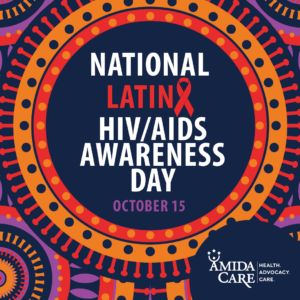National Latinx HIV/AIDS Awareness Day: Do It Your Way

The last day of Hispanic Heritage Month is October 15, also observed as National Latinx HIV/AIDS Awareness Day. Unfortunately, Hispanic Americans continue to be disproportionately impacted by HIV. According to the CDC, in 2019 Hispanic/Latino people accounted for 18% of the U.S. population but 25% of people with HIV. Furthermore, while new HIV infections declined 8% overall from 2015 to 2019, they remained stable among Hispanic/Latino people during that timeframe.
This year’s theme is “Do it your way. Do it right.” Not only does the Latine community encompass many different nationalities and cultures—Puerto Rican, Dominican, Mexican, Ecuadorean, etc. — but also different races; Latines can be Black, Caucasian, Indigenous, and Asian. Add to the mix various other LGBTQIA+ identities, and this intersectionality guarantees that there is no one-size-fits all response when it comes to HIV outreach, education, testing and treatment.
According to the Office of Minority Health, Hispanic males are four times as likely to have either HIV infection or AIDS as compared to white males and Hispanic females were four times as likely to have AIDS in 2019 as compared to white females. Additionally
- A recent CDC report found that 35% of Hispanic/Latina transgender women had HIV, compared to 17% of white transgender women.
- In 2020 just 16% oof Latine/Hispanic people eligible for preexposure prophylaxis (PrEP) in the U.S were prescribed it, compared to 65% of white people.
According to a recent article published by the National Institutes of Health, Black and Latino men who have sex with men (MSM) and trans women expressed low awareness of PrEP, a critical HIV prevention tool. Barriers to PrEP include discrimination, greater feelings of stigma toward LGBTQ+ identities as well as people living with HIV, language barriers, undocumented status, and lack of health insurance.
This reflects an urgency for more comprehensive PrEP education and further development of community partnerships with agencies serving Latino MSM. A study promoting PrEP uptake for Latinos suggested the use of promotores/promotoras, who are trusted community members who could communicate medical language and bridge PrEP services to Latino communities placed at greatest risk for HIV.
Crucial to the health of the Hispanic/Latinx community is Medicaid, the largest source of insurance coverage for people living with HIV in the U.S. As current Medicaid enrollment cuts pose a serious threat to the community, recertification efforts must be a priority, as highlighted in this El Diario op-ed by Guillermo Chacon, President of the Latino Commission on AIDS and Amida Care Board Member.
More targeted and culturally appropriate PrEP information and referrals, plus better access to HIV testing and treatment, will help end the HIV epidemic in the Hispanic community.
